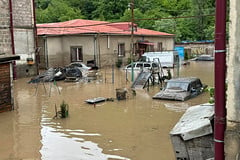
The U.S. Department of State is currently experiencing technical problems with its visa system, which are affecting global operations. This issue is worldwide and is not specific to any particular country or visa category. We recognize and deeply regret the inconvenience to travelers. We are doing everything possible to return passports with visas as soon as we are able to complete processing. We regret that we are currently unable to predict how long the delay will be.
Applicants who interviewed with the U.S. Embassy/Consulate after July 20 and who would like their passports returned to them without the U.S. visa may contact at [email protected] and provide their name, passport number, and case/bar code number. They may later return their passports and complete their visa applications for no additional fees within a year.
Applicants who have an urgent need to travel to the United States may contact at [email protected] with their name, passport number, and nature of the emergency. Please understand that only true emergencies of an extraordinary humanitarian nature can be considered for exceptional handling.
We appreciate your patience as we work to resolve this matter and apologize for the inconvenience.
Q: What caused the system performance issues? Hardware, software, or both? Details?
-
On July 20, to improve overall system performance and address previous intermittent performance issues, we updated software per industry recommendations. Our database began experiencing significant performance issues shortly after this maintenance was performed.
-
A root cause has not been identified at this time. Current efforts are focused on bringing the system back to normal operations. Once that has been accomplished, resources will be applied to determine the root cause.
Q: What steps did we take to mitigate the performance issues?
-
Since July 20, our team has worked to restore operations to full capacity. On July 23, the CCD was brought back online with limited capacity.
-
The Department of State is working with Oracle and Microsoft to implement system changes aimed at optimizing performance and addressing ongoing performance issues.
-
We are increasing the number of processed cases as our systems allow.
Q: Has CA experienced these types of outages in the past?
-
CA has experienced minor outages in the past, but not of this magnitude.
Q: Is the software to blame? Contractors at fault? Why was this allowed to happen?
-
We have been working to improve our services through upgrades while maintaining existing operations worldwide.
Q: Why did those steps not work? What’s the next step?
-
We have not determined why the problems occurred. We are working with our contractor and the software vendor to address the problems.
-
We are bringing additional servers online to increase capacity and response time.
Q: Why wasn’t there a back-up server?
-
Back-up capability and redundancy are built into the system. The upgrade affected our current processing capability, in part because it interfered with the smooth interoperability of redundant nodes.
Q: What steps are being taken to prevent this from happening again?
-
CA plans to upgrade the CCD to a newer version of the Oracle commercial database software by the end of the calendar year. We are installing additional servers to stabilize the existing system until the new database is thoroughly tested and operational.
Q: What are we telling visa and passport applicants?
-
Almost all passports are currently being issued within our customer service standards, despite the system problems. We are issuing passports for emergency travel.
-
We are telling visa applicants to expect delays as we process pending cases. We remain able to quickly process emergency cases to completion.
-
We are posting updates to the visa page of travel.state.gov, and our embassies and consulates overseas are communicating with visa applicants.
-
In addition to communicating through our websites, e-mail, and letters, we are also reaching out to applicants via Facebook and other social media sites, such as Weibo, to relay the latest information.
Q: How are embassy/consulates returning passports to applicants who need to travel but don’t have visas?
-
Some individuals would like to have their passports returned before their U.S. visa is printed, and we are working with our posts around the world to develop procedures to manage these requests.
Q: How can I contact my embassy/consulate to find more information?
-
Each embassy and consulate will post contact information on its website for applicants with questions about the status of their cases. Check the webpage of the embassy or consulate where you scheduled your interview for additional information.
Q: Why hasn’t the Department been more forthcoming until now?
-
We have experienced CCD outages in the past, but they have never disrupted our ability to perform consular tasks to this extent.
-
We informed the public as soon as it was apparent the CCD would not quickly be restored to normal operating capacity, and have issued regular updates since then.
Q: How are cases being prioritized? What about medical emergencies?
-
More than 50 percent of pending nonimmigrant visas cases are being printed, with the goal of prioritizing those pending the longest.
-
In addition, we are prioritizing immigrant visa and adoption cases, nonimmigrant medical emergencies, and humanitarian cases.
Q: What is the outlook for NIVs? When do we estimate the backlog will be processed?
-
Current efforts are focused on restoring the system to normal operations, while continuing to adjudicate new applications.
-
We are committed to reducing the number of pending visa cases as quickly as possible.Applicants should anticipate that visa issuance may be delayed 10-14 days until the system is restored to full functionality and pending applications are printed.
Q: Is the Department going to reimburse applicants who missed flights/canceled weddings/missed funerals?
-
We sincerely regret any delays, inconvenience, or expense that applicants have may have incurred due to the CCD performance issues.
-
We have always advised travelers NOT to make final travel plans until they have a visa in hand. Even when the CCD is operating normally, there may be delays in visa approval or issuance.
Q: What impact will this have on SIVs?
-
SIV processing continues and remains a high priority.
Q: How is this impacting student visas? They are scheduled to start the fall semester soon.
-
We understand the importance to international students and exchange visitors, their families, and their U.S. host institutions of timely visa issuance in order to facilitate travel and to ensure all students and exchange visitors may begin their programs on time.
-
We are committed to issuing visas to all qualified students and exchange visitors. Student and exchange visitor visa applicants should submit their applications well in advance of expected travel dates. We will make every effort to ensure timely visa issuance.
Q:What about situations where the student won’t arrive to school on time?
-
Students should contact their educational institution’s Designated School Official (F and M visas) or designated U.S. sponsor’s Responsible Officer (J visas) and discuss with them what arrangements they can provide for you to begin your program after the start date on your Form I-20 (F and M visas) or Form DS 2019 (J visas), should such a circumstance become necessary.
Q: Will this have any impact on the Diversity Visa program in September?
-
Immigrant visa processing (including diversity visas) continues and remains a high priority. The Department expects to have used all numbers for DV-2014 when the program year ends on September 30, 2014.
Q: What impact do we anticipate this will have on the U.S. economy?
-
Tourism and students have a major impact on our economy. Last year, it was estimated that international visitors spent $180.7 billion and supported 1.3 million American jobs. International students contribute $24.7 billion to the U.S. economy through their expenditures on tuition and living expenses, according to the Department of Commerce.
-
We recognize the significant impact that international travel and tourism has on the U.S. economy, and are taking all possible steps to ensure that the economic impact is minimal.
-
People traveling under the Visa Waiver Program are not affected; nor are those whose previously-issued visas remain valid.
-
We routinely advise visa applicants to make appointments well in advance of planned travel, and not to book their travel until they have their printed visas in hand.
Q: How will this impact the President’s Travel and Tourism Strategy?
-
CA remains committed to supporting the President’s National Travel and Tourism Strategy, as underscored by our recent participation in the President’s Travel and Tourism Advisory Board in Minneapolis.
-
Executive Order 13597 directs the Department to ensure that 80 percent of B visa applicants worldwide can be interviewed within three weeks. As of July 22, nearly 90 percent of applicants were able to obtain an appointment within three weeks, waiting an average of only 8.4 days.
-
We do not anticipate falling below the 80 percent threshold, which we have consistently met since August 2012. We continue to interview applicants as usual at most posts and will move their cases through the system as quickly as possible.






















